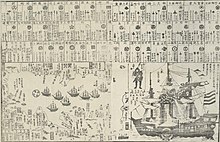Black ships
The Black Ships (also Black Fleet ; jap. 黒 船 , kurofune ) was a name given to western ships that landed in Japan between the 16th and 19th centuries . In particular, this name refers to the ships Mississippi , Plymouth , Saratoga and Susquehanna , which arrived in 1853 in the port of Uraga (part of what is now Yokosuka in Kanagawa Prefecture ) under the command of the American naval officer Commodore Matthew Perry .
Opening of the Japanese ports
Perry landed for the first time on July 8, 1853 with the four ships in the Bay of Edo (today Tokyo). He brought with him a letter from the then American President Fillmore requesting the opening of the Japanese ports and insisted on official receipt. The Shogun asked for time to think about it. Perry made it very clear that he would be back and await a response to the request in the letter.
The following year, on March 31, 1854, Perry returned with eight ships and expanded demands and forced the Shogun on the so-called " Treaty of Peace and Friendship " ( 日 米 修好 通商 ō ), the formal diplomatic relations between Japan and the United States States established.
Eternalization in poetry
The surprise and confusion these ships caused are immortalized in this famous kyōka (a humorous poem similar to the 5-line waka ):
| 泰 平 の | Taihei no |
| 眠 り を 覚 ま す | Nemuri o samasu |
| 上 喜 撰 | Jokisen |
| た っ た 四 杯 で | Tatta shihai de |
| 夜 も 眠 れ ず | Yoru mo nemurezu |
This poem is a complex system of language jokes (Japanese kakekotoba ): Taihei ( 泰 平 ) means "calm", Jōkisen ( 上 喜 撰 ) is the name of an expensive brand of green tea that contains large amounts of caffeine and means shihai ( 四 杯 ) "Four cups" so that one can read the poem literally as:
- "Woke up from sleep in
a peacefully quiet world
through Jokisen tea
with only four cups of it
no more sleep possible at night."
However, the text can also be read differently: Taihei can refer to the Pacific Ocean ( 太平 ), jōkisen also means “steam ships” ( 蒸 気 船 ) and shihai also means “four vehicles” ( 四 隻 ). The poem can therefore also be read in its hidden meaning like this:
- "The steamships
break
the peaceful slumber of the Pacific,
only four boats are enough to
keep us awake at night."
See also
Web links
Individual evidence
- ↑ a b c Thomas Röbke : Fascination of the Foreign , PM History # 2/2016, pp. 26–33.

